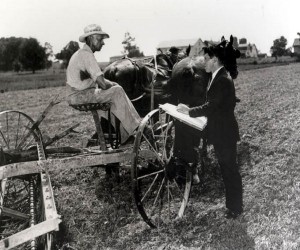
Our information-centric connected society creates great risk for misinformation to thrive and become accepted fact. You cannot allow this to happen. If you scan headlines or move quickly between information sources without investigating data yourself, then you may easily fall prey to misinformation. And government data is just as likely to be wrong as other data.
A story about my own ancestors underscores this issue. Regular Big Thinking readers know that I’m an avid amateur genealogist. Yet something only four generations back involving people who were known to people still alive is a victim of bad information.
In the mid 19th century, one of my direct ancestors had a large farm family. The oldest son married in February 1850 at the age of 21, and he and his new bride lived on the farm. A census taker arrived at the farm some months later and listed the new couple as siblings while writing down everyone’s name and relationships. She wasn’t a daughter. She was a daughter-in-law. Big difference.
But it becomes even more complicated. The couple had three children in 10 years. They all lived on the farm. I have the birth records and more importantly, I have their marriage record. The oldest son and his youngest brother both enlisted when the Civil War started. Months later, the oldest brother was dead. His younger brother was captured a year later and became a prisoner of war for years. I have both of their Civil War records, more than 35 documents in all. And when the youngest brother was released in 1865, he made his way home.
Eight months following his release, the younger brother married his widowed sister-in-law. And he lived another 53 years. I have all those records too. There’s nothing unusual or salacious about this story. The problem resides in the bad data capture in 1850, not any of the events in 1860 or 1865. But amateur genealogists, likely spurred on by the new NBC show Who Do You Think You Are?, are flooding genealogy sites with pasted together records and data without carefully examining any of it. As a single voice yelling at the web, I can’t overturn the activity of dozens of extended relatives who are posting that this woman was their sister or using her married name instead of her maiden name or other mistakes. And the entire issue boils down to a census enumeration in a very rural North Carolina town in 1850.
Your takeaway as a small business leader is to examine all data–even government data–before adopting it in your business. If you recite a fact that later proves to be inaccurate, your personal and corporate reputation as an expert is in jeopardy. You can even lose a customer. Even bigger repercussions exist if attorneys get involved and start tossing around phrases like “known or should have known…” Knowing your data and trusting its source blindly is asking for all sorts of trouble. Learn the source and verify through original documents if you can. I’m 83% certain this will help you.